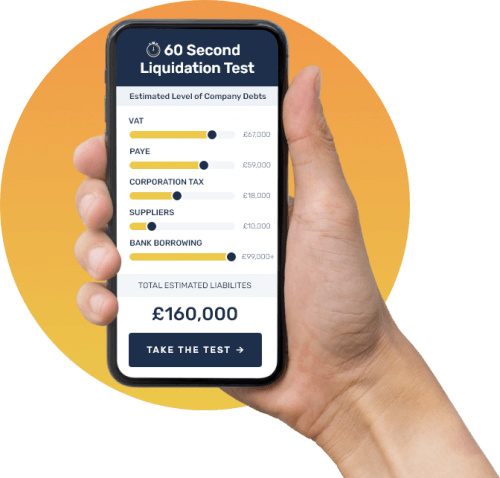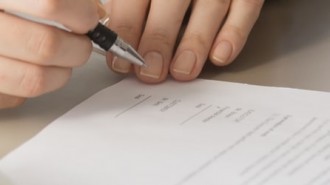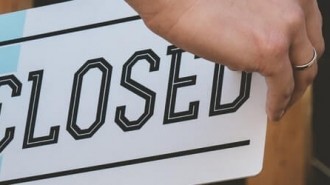Can I strike off a company with debts and what are the alternatives?
If your limited company has debts you cannot or do not want to pay, you might consider Company Strike Off, also known as Dissolution, as an effective way to close it down. After all, the process is cheap and relatively straightforward. However, striking off a limited company is not a suitable way to close a company with debts, and if you do take this approach, it could have serious consequences for you personally.
What does striking off a company mean?
The process of striking a business off the Companies House register is one you initiate as a company director. You can follow the process online or submit form DS01 to Companies House and pay a nominal fee.
As long as all the details are correct, your application to strike off will be advertised in the Gazette to give interested parties, including any creditors you may have, time to object. If you receive no objections and the company meets the eligibility requirements for strike off, another notice will be placed in the Gazette and the company will be struck off the register.
As well as being cost-effective, one of the main benefits of strike off is that you retain full control of the business throughout. However, one of the key requirements for strike off is that the company must be solvent. If it has debts you cannot pay (it’s insolvent), you must use a different process, such as a Creditors’ Voluntary Liquidation (CVL).
Worried about your Bounce Back Loan?
If you are a limited company director worried about how you are going to repay your Bounce Back Loan, we are here to help. As licensed insolvency practitioners we can talk you through your options when it comes to repaying your outstanding Bounce Back Loan, as well as handling all negotiations with creditors on your behalf. Call our team today on 0800 063 9262 .
What happens if I try to strike off a company with debts?
If you try to strike off a company with debts, your strike-off application won’t be dismissed out of hand. You can start the process, but the problems are likely to come later.
As part of the process, you have a legal duty to inform interested parties, including your creditors, employees and shareholders, of your intention to strike off. A notice will also be placed in the Gazette, making it public knowledge. Creditors such as the banks and HMRC pay close attention to these notices and can lodge an objection that will halt your attempts to dissolve the company.
Your creditors can then take action against you to force the repayment of the debt, which could lead to Compulsory Liquidation by the court. That will put you in a trickier situation than if you had liquidated the company voluntarily, as there will be a greater risk of repercussions for you personally.
Even if you’re successful in striking off the business, your creditors can apply to the court to restore the company to the register so they can take action to recover the debt. In the case of HMRC, any interest and penalties can also be backdated to the date of striking off. You will also be open to accusations of misconduct because, as a company director, you must be aware of the company’s financial position at all times.
What are the potential consequences if you strike off a company with debts?
If you strike off a company with debts that a creditor restores to the register, your conduct is likely to be investigated and penalties could be handed down by the Insolvency Service, including:
- Fines based on the severity of the case
- Directors being made personally liable for company debts
- Disqualification from acting as a company director for a period of between two and 15 years
- Custodial sentences in the worst cases
Given the severity of these penalties, you should repay all your creditors before trying to strike off a limited company. If you cannot afford to repay your debts, you should use a more suitable closure method.
How can I close a company with debts?
If your company has debts it cannot pay, a Creditors’ Voluntary Liquidation (CVL) is usually the best approach. In this process, you appoint an insolvency practitioner to act as the liquidator and close the company on your behalf.
They will take charge of the company and identify and dispose of its assets for the best possible price. They then distribute the proceeds among your creditors before removing the company from the official register. Any debts that you cannot repay from the sale of assets will be written off.
Another benefit of the CVL process is that it provides a degree of legal protection. By liquidating the company voluntarily, you demonstrate that you are taking your responsibilities as a director seriously and protecting the interests of your creditors. That reduces the likelihood of accusations of misconduct and wrongful trading and is preferable to being liquidated by the court.
If you use a CVL, you could also be eligible to claim director’s redundancy pay. With payments averaging around £10,000, it should be enough to cover the liquidator’s fee and provide you with a useful sum while you consider your next steps.
Start your online liquidation today
If you have decided liquidation is the right option for your limited company, you can take the first step and begin the process online using our online portal. Starting the process is quick, simple, and can be done at a time that suits you. Your information will be submitted to your local UK Liquidators insolvency practitioner who will be with you every step of the way. Click here to start your company’s liquidation online.
Want to close a business with debts?
If your company has debts that it cannot repay, we can help you find the most cost-effective way to close it down. We will explain how Company Dissolution and insolvent liquidation work and advise you on the right approach for your situation. Please contact our team for a free, same-day consultation or arrange a meeting at our network of offices throughout the UK.
If you are considering liquidation for your limited company, taking advice from a licensed insolvency practitioner can help you understand your options.
Take our 60 second test and find out




























